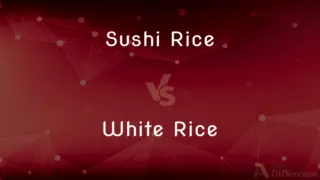Leftover vs. Remainder — What's the Difference?
By Tayyaba Rehman & Urooj Arif — Updated on April 20, 2024
Leftovers refer to food remaining after a meal, while remainders denote what is left after subtraction or distribution, applicable in various contexts.

Difference Between Leftover and Remainder
Table of Contents
ADVERTISEMENT
Key Differences
Leftovers typically refer to unconsumed portions of food from a meal, saved for later use. On the other hand, remainders are the amounts left after part of a whole has been used, distributed, or subtracted, which can apply to objects, mathematical results, or quantities.
In the context of meals, leftovers are often seen as a way to minimize waste and maximize food utility, preserving food for future consumption. Whereas remainders might not necessarily be about conservation but about what is left from an original amount after certain parts have been taken away or allocated.
Leftovers are usually stored in refrigerators and consumed within a few days to ensure they remain safe and palatable. On the other hand, remainders could be non-perishable items or abstract concepts like numbers or percentages that do not require such considerations.
The term leftovers is generally limited to food and related contexts. Meanwhile, remainders have a broader application, including mathematical concepts like the remainder theorem or remainders in division, inventory left unsold, or the balance of a debt.
Leftovers are often planned around in household meal planning to ensure food efficiency. In contrast, remainders might be unplanned residues that arise naturally from various processes or transactions.
ADVERTISEMENT
Comparison Chart
Definition
Food not consumed in a meal
Part left after subtraction
Context
Mainly culinary
Broad, including math
Storage
Requires refrigeration
Varies widely
Usage
Eaten later
Used or discarded
Associated Planning
Meal planning
Not necessarily planned
Compare with Definitions
Leftover
Food remaining from a previous meal.
I packed the leftovers from dinner for lunch.
Remainder
The part left after other parts have been removed.
The remainder of the cake was left in the fridge.
Leftover
Unused ingredients stored for future use.
We have some leftovers in the fridge that could make a good omelet.
Remainder
Leftover amount after allocation or usage.
The remainder of the budget was allocated to new projects.
Leftover
Portions saved intentionally for another meal.
She kept the leftovers for her kids after school.
Remainder
The balance of something remaining.
Only a small remainder of the original forest remains.
Leftover
Extra servings not consumed during the initial meal.
The party left us with a lot of pizza leftovers.
Remainder
A mathematical term for what is left after division.
The remainder when dividing 11 by 3 is 2.
Leftover
Remains of a meal to be consumed later.
The lasagna leftovers tasted even better the next day.
Remainder
Residual quantity left after most has been taken.
A small remainder of the stock is still unsold.
Leftover
Remaining as an unused portion or amount.
Remainder
In mathematics, the remainder is the amount "left over" after performing some computation. In arithmetic, the remainder is the integer "left over" after dividing one integer by another to produce an integer quotient (integer division).
Leftover
A remnant or an unused portion.
Remainder
A part of something that is left over when other parts have been completed, used, or dealt with
The remainder of the year
Leave a few mushrooms for garnish and slice the remainder
Leftover
Leftovers Food remaining from a previous meal.
Remainder
A property interest that becomes effective in possession only when a prior interest (created at the same time) ends.
Leftover
Remaining; left behind; extra; in reserve.
Do you want some of the leftover supplies from the event?
I have some leftover spaghetti in the fridge, so I don't plan to cook tonight.
Remainder
Dispose of (a book left unsold) at a reduced price
Titles are being remaindered increasingly quickly to save on overheads
Leftover
Something left behind; an excess or remainder.
It's a leftover from yesterday, but it's still perfectly good.
Remainder
Something left over after other parts have been taken away.
Leftover
Remaining after a meal is complete or eaten for a later meal or snack.
Not leftovers again!
The entire wheel of cheese is a leftover from the party.
Remainder
The number left over when one integer is divided by another
The remainder plus the product of the quotient times the divisor equals the dividend.
Leftover
Not used up; remaining after use of part; as, unusable leftover auto parts.
Remainder
The number obtained when one number is subtracted from another; the difference.
Leftover
Remaining from a previous meal; - of food; as, leftover food served at a later meal.
Remainder
(Law) An estate in property that takes effect after the expiration of another estate, as where one party is given the right to occupy a property for that party's lifetime, and then another party is given the same right after the first party's death.
Leftover
An unused part or portion; - used especially of food remaining uneaten from a previous meal; as, to have leftovers for dinner.
Remainder
A book that remains with a publisher after sales have fallen off, usually sold at a reduced price.
Leftover
A small part or portion that remains after the main part no longer exists
Remainder
To sell or dispose of as a remainder.
Leftover
Not used up;
Leftover meatloaf
She had a little money left over so she went to a movie
Some odd dollars left
Saved the remaining sandwiches for supper
Unexpended provisions
Remainder
A part or parts remaining after some has/have been removed.
My son ate part of his cake and I ate the remainder.
You can have the remainder of my clothes.
Leftover
Uneaten and saved for eating later;
Leftover food served at a later meal
Yesterday's reheated soup
Remainder
(mathematics) The amount left over after subtracting the divisor as many times as possible from the dividend without producing a negative result. If n (dividend) and d (divisor) are integers, then n can always be expressed in the form n = dq + r, where q (quotient) and r (remainder) are also integers and 0 ≤ r < d.
17 leaves a remainder of 2 when divided by 3.
11 divided by 2 is 5 remainder 1.
Remainder
(mathematics) The number left over after a simple subtraction
10 minus 4 leaves a remainder of 6
Remainder
(commerce) Excess stock items left unsold and subject to reduction in price.
I got a really good price on this shirt because it was a remainder.
Remainder
(legal) An estate in expectancy which only comes in its heir's possession after an estate created by the same instrument has been determined
Remainder
Remaining.
Remainder
To mark or declare items left unsold as subject to reduction in price.
The bookstore remaindered the unsold copies of that book at the end of summer.
Remainder
Anything that remains, or is left, after the separation and removal of a part; residue; remnant.
If these decoctions be repeated till the water comes off clear, the remainder yields no salt.
Remainder
The quantity or sum that is left after subtraction, or after any deduction.
Remainder
An estate in expectancy, generally in land, which becomes an estate in possession upon the determination of a particular prior estate, created at the same time, and by the same instrument; for example, if land be conveyed to A for life, and on his death to B, A's life interest is a particuar estate, and B's interest is a remainder, or estate in remainder.
Remainder
Remaining; left; left over; refuse.
Which is as dry as the remainder biscuitAfter a voyage.
Remainder
Something left after other parts have been taken away;
There was no remainder
He threw away the rest
He took what he wanted and I got the balance
Remainder
The part of the dividend that is left over when the dividend is not evenly divisible by the divisor
Remainder
The number that remains after subtraction; the number that when added to the subtrahend gives the minuend
Remainder
A piece of cloth that is left over after the rest has been used or sold
Remainder
Sell cheaply as remainders;
The publisher remaindered the books
Common Curiosities
How are remainders used in mathematics?
In division, a remainder is the amount that does not evenly divide by the divisor.
What are some examples of remainders in real life?
Unsold items after a sale, unused budget in projects, and leftover materials in construction.
What are leftovers?
Food that remains uneaten at the end of a meal and is saved for later.
Can leftovers improve in flavor?
Yes, some meals, like stews and casseroles, often taste better the next day.
What does remainder mean?
It refers to what is left after part of a whole has been used or taken away.
Are leftovers safe to eat after several days?
Leftovers can be safe if stored properly, but generally should be eaten within 3-4 days.
Can leftovers be anything other than food?
Typically, the term leftovers is used specifically for food.
Can remainders be planned for in business or budgets?
Yes, planning for remainders is common in budgeting and inventory management.
How should leftovers be stored to ensure safety?
They should be refrigerated promptly and kept in air-tight containers.
Is there a specific way to calculate remainders?
Remainders can be calculated using division in mathematics.
What happens to the remainder in a division if it's zero?
If the remainder is zero, it means the division is exact and there are no leftovers.
Share Your Discovery

Previous Comparison
However vs. Whatever
Next Comparison
Boolean vs. BoolAuthor Spotlight
Written by
Tayyaba RehmanTayyaba Rehman is a distinguished writer, currently serving as a primary contributor to askdifference.com. As a researcher in semantics and etymology, Tayyaba's passion for the complexity of languages and their distinctions has found a perfect home on the platform. Tayyaba delves into the intricacies of language, distinguishing between commonly confused words and phrases, thereby providing clarity for readers worldwide.
Co-written by
Urooj ArifUrooj is a skilled content writer at Ask Difference, known for her exceptional ability to simplify complex topics into engaging and informative content. With a passion for research and a flair for clear, concise writing, she consistently delivers articles that resonate with our diverse audience.















































